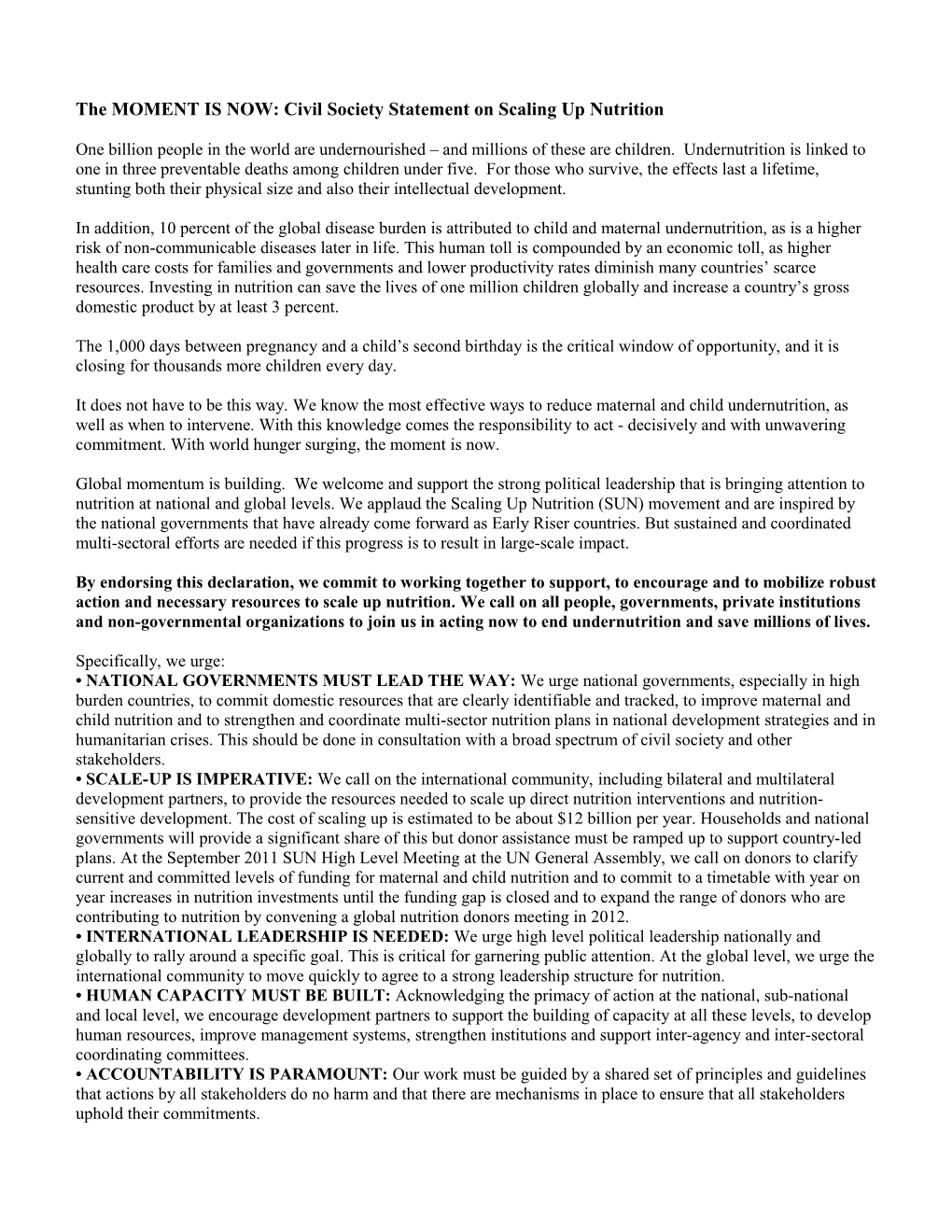The MOMENT IS NOW: Civil Society Statement on Scaling Up Nutrition
One billion people in the world are undernourished – and millions of these are children. Undernutrition is linked to one in three preventable deaths among children under five. For those who survive, the effects last a lifetime, stunting both their physical size and also their intellectual development.
In addition, 10 percent of the global disease burden is attributed to child and maternal undernutrition, as is a higher risk of non-communicable diseases later in life. This human toll is compounded by an economic toll, as higher health care costs for families and governments and lower productivity rates diminish many countries’ scarce resources. Investing in nutrition can save the lives of one million children globally and increase a country’s gross domestic product by at least 3 percent.
The 1,000 days between pregnancy and a child’s second birthday is the critical window of opportunity, and it is closing for thousands more children every day.
It does not have to be this way. We know the most effective ways to reduce maternal and child undernutrition, as well as when to intervene. With this knowledge comes the responsibility to act - decisively and with unwavering commitment. With world hunger surging, the moment is now.
Global momentum is building. We welcome and support the strong political leadership that is bringing attention to nutrition at national and global levels. We applaud the Scaling Up Nutrition (SUN) movement and are inspired by the national governments that have already come forward as Early Riser countries. But sustained and coordinated multi-sectoral efforts are needed if this progress is to result in large-scale impact.
By endorsing this declaration, we commit to working together to support, to encourage and to mobilize robust action and necessary resources to scale up nutrition. We call on all people, governments, private institutions and non-governmental organizations to join us in acting now to end undernutrition and save millions of lives.
Specifically, we urge:
• NATIONAL GOVERNMENTS MUST LEAD THE WAY:We urge national governments, especially in high burden countries, to commit domestic resources that are clearly identifiable and tracked, to improve maternal and child nutrition and to strengthen and coordinate multi-sector nutrition plans in national development strategies and in humanitarian crises. This should be done in consultation with a broad spectrum of civil society and other stakeholders.
• SCALE-UP IS IMPERATIVE:We call on the international community, including bilateral and multilateral development partners, to provide the resources needed to scale up direct nutrition interventions and nutrition-sensitive development. The cost of scaling up is estimated to be about $12 billion per year. Households and national governments will provide a significant share of this but donor assistance must be ramped up to support country-led plans. At the September 2011 SUN High Level Meeting at the UN General Assembly, we call on donors to clarify current and committed levels of funding for maternal and child nutrition and to commit to a timetable with year on year increases in nutrition investments until the funding gap is closed and to expand the range of donors who are contributing to nutrition by convening a global nutrition donors meeting in 2012.
• INTERNATIONAL LEADERSHIP IS NEEDED: We urge high level political leadership nationally and globally to rally around a specific goal. This is critical for garnering public attention. At the global level, we urge the international community to move quickly to agree to a strong leadership structure for nutrition.
• HUMAN CAPACITY MUST BE BUILT: Acknowledging the primacy of action at the national, sub-national and local level, we encourage development partners to support the building of capacity at all these levels, to develop human resources, improve management systems, strengthen institutions and support inter-agency and inter-sectoral coordinating committees.
• ACCOUNTABILITY IS PARAMOUNT: Our work must be guided by a shared set of principles and guidelines that actions by all stakeholders do no harmand that there are mechanisms in place to ensure that all stakeholders uphold their commitments.
1,000 Days / Hunger Alliance of GhanaAction Against Hunger / Hunger Project
African Nutrition Society / International Union of Nutritional Sciences
African Women International / Jesuit Center for Theological Reflection
Agriculture for Impact / John Snow Incorporated
Alliance Against Hunger and Malnutrition / London School of Hygiene and Tropical Medicine
Alliance to End Hunger / Lutheran World Relief
Anglican Diocese of Niassa, Mozambique / Management Sciences for Health
Bien Etre de la Femme et de l'Enfant au Niger / Mercy Corps
Bread for the World / Micronutrient Initiative
Centre for Health Care Management / Naadutaro Pastoralists Survival Options
Chouaib Doukkali University, Morocco / National Institute of Health & Family Welfare, India
Church World Service / Nourishing the Planet
Civil Society for Poverty Reduction Zambia / Office of Social Justice
Concern Worldwide / Oxfam
Congressional Hunger Center / PANITA (Partnership for Nutrition in Tanzania)
CORE Group / PATH
Curamericas Global - Hope Through Health / Population Services International
DAI / Public Health Nutrition and Development Centre
Emergency Nutrition Network / ReSurge International
ESTAMOS organização Comunitaria / Save the Children
Ethiopian Public Health Association / Self Help Africa
FHI 360 / Sight and Life
Food for the Hungry / Tufts University
Freedom from Hunger / United Nations World Food Programme
GAIN / WellShare International
Global Health Council (No Logo) / Women Thrive Worldwide
Helen Keller International / World Vision
Humanitas Global Development / World Vision Uganda
